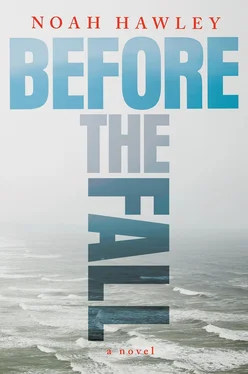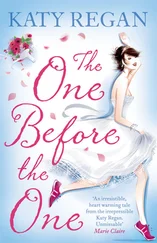Flames. The outline of a building.
Your imagination does the rest.
Chapter 28. Public / Private
A car horn wakes him, long and insistent. Layla is gone. The horn comes again. Scott gets to his feet, walks naked to the window. There is a news crew outside, satellite van parked on the curb, dish deployed.
They have found him.
He steps back from the curtain, finds the remote, turns on the television. The image of a house appears, a white three-story with blue windows and black stars on a tree-lined street in New York City. It is the house he’s standing in. A news scroll slides along under the house, displaying words and numbers — the NASDAQ down 13 points, Dow Jones up 116. On the left-hand side of the screen, Bill Cunningham occupies his own box, leaning into the lens.
“—he’s shacking up, apparently, with the famous radical heiress, whose father gave over four hundred million dollars to lefty causes last year. You remember, dear viewers, the man who tried to buy the 2012 election. Well, this is his little girl. Although — not so little anymore — look at these pictures of her from a film festival in France earlier this year.”
Onscreen, the house slides to a smaller box, replaced in the main window by still images of Layla in a series of revealing ball gowns, clipped from style sheets and scandal rags. There is a bikini shot long-lensed from an actor’s yacht.
Scott wonders if Layla is in the house, watching this.
As if hearing his thoughts, the apartment door opens. Layla comes in. She is dressed for a day of meetings, it appears.
“I didn’t tell anyone,” she says. “I swear.”
Scott shrugs. He never assumed she did. In his mind they are both an endangered species, discovered mid-molt by a curious child with poor impulse control.
Onscreen, he watches fifteen curtained windows, a narrow front door painted blue, two garage doors, also blue. The only thing shading his safe house from view is a narrow sapling, just a stick really with a halfhearted spray of green leaves. Scott studies the house he’s in on TV, concerned but also strangely fascinated, like a man watching himself being eaten alive. It seems he cannot avoid becoming a public figure now. That he must participate in this commercial dance.
How strange , he thinks.
Layla stands beside him. She is thinking about saying more, but doesn’t. After a moment she turns and wanders out of the apartment again. Scott hears the apartment door close, then the sound of her heels on the staircase. He stands staring at the house on television.
Bill Cunningham, looking energized, says:
“—movement in an upstairs window just moments ago. Sources tell us that Ms. Mueller lives in the house alone, which — how many bedrooms are there, dear viewers? Looks like at least six to me. And I can’t help but make some connections here — the head of a conservative news network dies in mysterious circumstances, and then the lone survivor of the plane crash shacks up with the daughter of a left-wing activist. Well, some people might call it a coincidence, but I do not.”
Onscreen one of the garage doors starts to open. Scott leans forward, watching more than just television now. He half expects to see himself pull out, but instead a black Mercedes emerges, Layla behind the wheel wearing oversize sunglasses. The news cameras move in, looking to block her way, but she pulls out quickly — more than willing to run them over — and makes a left turn, roaring off up Bank Street toward Greenwich before they can pen her in.
In her wake, the garage door closes.
“—the homeowner, definitely,” says Cunningham. “But I’m wondering, potentially, was this Burroughs fellow crouched down in the rear seat well, like some jailbreaker from a Peckinpah film.”
Scott turns off the TV. He is alone in the house now, standing naked in a white room, sun casting shadows on the floor. If he rations what he has, eats one meal a day, he can stay in this apartment for six days. Instead, he takes a shower, dresses for the day. Magnus , he thinks. If anyone talked, it was him. But when he calls Magnus, the Irishman claims ignorance.
“Slow up,” says Magnus. “What house is on television?”
“I need you to rent me a car,” Scott tells him after talking in circles around it. Magnus is uptown in what used to be Spanish Harlem, half in the bag, though it’s only ten in the morning.
“You put in a good word, yeah?” says Magnus. “With Layla? Whispered a little something in that beautiful ear. Magnus is the best painter. Something along those—”
“Last night. I went on at length about your use of color and light.”
“Right on, boyo. Right fecking on.”
“She was hoping to come by this weekend, maybe see the new work.”
“I’ve gone full chubby,” says Magnus, “just in the last few seconds. The head is purple and engorged, like a snakebite.”
Scott crosses to the window. The curtains are sheer, but not see-through. Scott tries to look down, aware that people are out there looking back at him. He catches a glimpse of a second news van pulling into the curb.
“Doesn’t have to be a big car,” he says. “I just need it for a couple of days to drive up to Croton.”
“Want me to come?” says Magnus.
“No. I need you here,” Scott replies. “Holding down the fort. Layla likes to stay up all night, if you get my meaning.”
“Consider it held, my friend. I’ve got enough Viagra to last until Halloween.”
After they hang up, Scott grabs his jacket, walks into the living room, then stops short. In all the chaos he has forgotten the hours he spent last night eradicating the white. He stands now in a cube of charcoal and lipstick, beet stains dried in ruby streaks. The Martha’s Vineyard farmers market surrounds him — a study for a painting in three dimensions — so that the room’s furniture appears to be set in the middle of the open square. There is the fishmonger on the far wall, open coolers of ice below a long white card table; rows of vegetables, triple trays of berries. And faces, reconstructed from memory, sketched quickly with crumbling coal.
And there, seated on a white canvas chair, is Maggie, her head and shoulders sketched on the wall, her body outlined on the fabric of the chair. She is smiling, eyes shadowed by a big summer hat. Her two children flank her on either side of the chair, the girl, standing to her shoulder, on the right. The boy, half obscured behind a side table, on the left — just his tiny arm visible, attached to a slice of shoulder, a striped shirt, stripes the color of beets, stopping in the middle of his biceps, the rest of him hidden by wood.
Scott stands frozen in the middle of this scene, out of time, surrounded by ghosts. Then he goes downstairs to face the crowd.
I never liked to exercise,” said Jack LaLanne. “But I like results.”
This was clear from his triceps definition alone, not to mention the Clydesdale heft of his beer-barrel thighs. A man of average height, bursting at the seams of his short-sleeved jumpsuit. In his house he kept an exercise museum, packed with obscure tech, most of it self-made. Jack invented the leg extension machine in 1936, you see. His approach was to work a muscle until it failed, believing, as he did, in the power of transformation through deep-tissue annihilation.
In the beginning, he wore a T-shirt and your standard pair of pants to train. He liked the feeling he got from stressing the weave. Then he had the idea to display himself in fitted jumpsuits — a uniform of self-improvement — so he went to the Oakland Pants Factory. He gave them sketches, an array of color choices. Blues and grays mostly. An African American woman took his measurements with a cloth tape, rolling around him on a squeaky metal chair. In those days wool was the only fabric that would stretch, and so they made the jumpsuits out of that, milled as thin as the material would allow. Jack liked them shiny, he told her, peacocking, and sleeveless to show his rolling arms, and tapered at the waist.
Читать дальше












